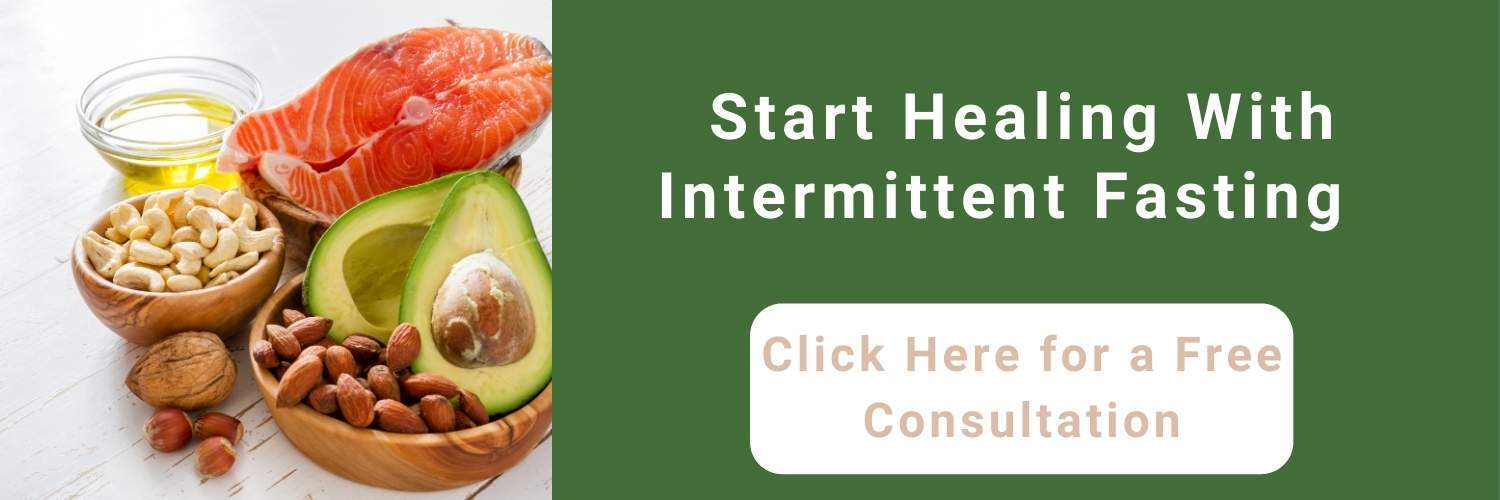A Complete Guide To Intermittent Fasting For Women Over 40
"The content below is not intended to be a substitute for professional medical advice, diagnosis, or treatment. Always seek the advice of your physician or other qualified health provider with any questions you may have regarding a medical condition."
Intermittent fasting. You’ve probably heard of it.
It’s popular with celebrities like Jennifer Aniston, Halle Berry, Hugh Jackman, and Jimmy Kimmel.
Maybe you’ve got friends avoiding food until lunchtime each day, or perhaps you’ve seen it on Instagram.
Is intermittent fasting a trend or is it here to stay? A survey from the International Food Information Council Foundation found one in 10 people is following a fasting diet. But the concept of fasting is nothing new. Fasting and even intermittent fasting have been around for centuries.
If you’re interested in this nutritional lifestyle change, read on to learn how it works, potential risks and benefits, and various methods to try.
Table of Contents
What is Intermittent Fasting?
Intermittent fasting isn’t a diet. There’s no list of foods to avoid or the requirement to track macronutrients or calories each day.
Intermittent fasting is less about what you eat and more about when you eat. Intermittent fasting is an eating pattern that cycles between fasting periods (either no food consumption at all or restricted calorie consumption) and periods of unrestricted eating.
The duration of the eating and fasting periods varies based on the method of intermittent fasting.
During your fasting periods, you can consume zero-calorie beverages such as:
- Water
- Tea
- Black Coffee
These can help you stave off hunger pains and feel full during your fasting periods.
The Science Behind How Intermittent Fasting Works
Thanks to its potential benefits for cellular renewal and overall well-being, intermittent fasting has become increasingly popular in recent years. A 2014 study done by Longo and Mattson suggests that it can activate autophagy — a natural process in which the body clears out damaged cells and generates new, healthy ones. This cellular regeneration may be especially valuable for women over 40 because it may help maintain cell function and lower the risk of age-related conditions. By incorporating regular fasting periods, the body gets a break from constant digestion, which may support longevity and healthier aging
Is Intermittent Fasting Good for Women Over 40?
While intermittent fasting is considered relatively safe for healthy adults, it’s essential to consult a doctor before trying this type of eating regimen. Intermittent fasting may not be the right lifestyle choice if you:
- Are trying to conceive
- Are currently pregnant or breastfeeding
- Have diabetes
- Have low blood pressure
- Use medications requiring food intake
- Have a history of disordered eating
Potential Risks and Side Effects of Intermittent Fasting for Women Over 40
Even though intermittent fasting may provide many benefits, it may not be the best choice for everyone. That’s why it’s important to be aware of these potential risks and side effects as you consider changing your diet in this way:
- Nutrient deficiencies are more common in older women, and intermittent fasting can make them worse. It’s essential to prioritize eating nutrient-dense foods during the eating windows of an intermittent fasting schedule. This will support well-being and health.
- Bone health can be a potential issue with intermittent fasting. Getting enough calories from good nutrition sources is key to bone health, so restricting calories with intermittent fasting may have a negative impact — especially for older women who may be dealing with bone loss or weakening.
- Increased stress and anxiety may be risks associated with intermittent fasting that can lead to negative impacts on the overall health of women over 40.
Pay attention to changes you experience when practicing an intermittent fasting routine and talk to your healthcare provider for help and guidance.
Tips for Safe Intermittent Fasting
If you want to give intermittent fasting a try, you’ll want to do it in a safe way that protects your overall health and well-being. These tips can help:
- Be moderate – When starting something new, it can be tempting to take it to the extreme. The best approach with intermittent fasting may be the moderate approach. To start, choose a plan with low intensity — for example, fasting for 12 hours between 8 p.m. and 8 a.m. — and move to something more restrictive as you adjust to the new diet plan.
- Get the timing right – If you are pre-menopausal, timing your eating around your menstrual cycle may help you achieve better results. Try intermittent fasting a day or two after your period starts and a week or so after it ends. During the two weeks before your period, you are likely to be ovulating. Fasting during this time can affect your hormones.
- Practice healthy eating habits – Even though when you eat is the focus of intermittent fasting, it’s also crucial to think about what you eat. It’s best to avoid processed and sugary foods and prioritize lean proteins, whole grains, fruits, and vegetables. To avoid blood sugar spikes when you break your fast, eat a high-protein and high-fiber meal with healthy fats.
- Ask for help – Consult with a dietician or nutritional consultant like Dr. Sergi at HealthierU to help you articulate your goals and find effective strategies to help you meet them.
When it comes to intermittent fasting, there’s a lot of information out there.
You could easily Google “intermittent fasting, women over 40.”
OR
You could go straight to the experts and work with a nutritional therapy practitioner.
HealthierU is an excellent resource if you’re considering intermittent fasting.
HealthierU’s mission is to help patients overcome their health issues with nutrition and lifestyle guidance rather than medication or surgery. Dr. Donna Sergi has helped thousands of patients remedy problems with:
- Weight loss
- Digestive health
- Acid reflux
- Anxiety
- And more
If you’re considering intermittent fasting to lose weight or combat health issues, nutritional therapy with HealthierU is the perfect place to begin your journey.
8 Health Benefits of Intermittent Fasting for Women Over 40
Intermittent fasting isn’t a diet; it’s a lifestyle.
While most people turn to intermittent fasting to lose weight, there are more benefits to this type of lifestyle change than just slimming down, especially for women over 40.
These benefits include:
- Improved heart health
- Managing and reducing the risk of diabetes
- Weight loss
- Lower blood pressure and cholesterol levels
- Reduced inflammation
- Improved mental health
- Increased longevity
- Maintained lean muscle mass
Read on to learn more about the benefits of intermittent fasting.
#1: It May Improve Heart Health
Heart disease is the leading cause of death among American women.
Intermittent fasting has been shown to help improve heart health. A
study by the American Heart Association researching how routine fasting affects heart failure and heart attacks found routine fasters had a 71% lower rate of developing heart failure than non-fasters. There wasn’t a significant difference when it came to heart attacks.
#2: It May Help Manage And Reduce the Risk of Diabetes
According to the Centers for Disease Control and Prevention, nearly 30 million people in the U.S. have type 2 diabetes. Another 84 million people have prediabetes.
Treatment of type 2 diabetes is often a combination of medication and lifestyle changes such as:
- Following a healthy diet
- Exercising regularly
- Managing stress
While more research is necessary,
recent studies have shown men practicing intermittent fasting were able to improve their diabetes to the point that they no longer needed insulin.
#3: It May Help Improve Weight Loss
Weight loss is typically the catalyst for trying intermittent fasting, and for a good reason.
Harvard’s TH Chan School for Public Health examined 40 studies on intermittent fasting and found the practice to be effective for weight loss. The university’s review of the studies found a typical loss of 7–11 pounds over a ten-week period.
This is generally attributed to metabolic switching. Metabolic switching occurs after a person fasts for 8-12 hours. After that period, the body runs out of glucose and switches to burning stored fat cells.
People who combine intermittent fasting with a healthy eating plan during their eating periods and exercise consistently find even more success.
#4: It May Help Lower Your Blood Pressure and Cholesterol
Research shows fasting can help lower your blood pressure and cholesterol levels.
Intermittent fasting may help lower blood pressure by contributing to weight loss, improving insulin sensitivity, and influencing the gut microbiome. It can help regulate the hormone angiotensin II, which constricts blood vessels and increases blood pressure.
Promoting weight loss and shifting the body’s metabolism to using stored fat rather than glucose, intermittent fasting can help improve cholesterol levels. When this shift happens, LDL (“bad” cholesterol) may be reduced and HDL (“good” cholesterol) may be increased.
#5: It May Reduce Inflammation
A study performed by researchers at Mount Sinai concluded intermittent fasting reduces inflammation. This is good news as chronic inflammation can lead to various diseases, including:
- Diabetes
- Multiple sclerosis
- Alzheimer’s disease
- Obsessive-compulsive disorder
- Inflammatory bowel syndrome
- And more
#6: It May Improve Your Mental Health
A 2018 study on weight loss strategies found intermittent fasting was associated with improvements in emotional wellbeing and depression.
In another study, participants reported improved mood and decreased tension, anger, and confusion after three months of intermittent fasting.
#7: It May Increase Longevity
Recent studies have researched how fasting impacts lifespan.
One study followed 2,000 people over the course of more than four years. Nearly 20% of those involved in the study had been fasting regularly for at least five years. The study found lower mortality rates/increased longevity rates for the routine fasters.
Medical health experts continue to research the connection between intermittent fasting and longevity, but initial studies show positive results.
#8: It May Help Maintain Lean Muscle Mass
Sustained calorie restriction has been shown to reduce muscle mass. However, the same is not necessarily the case for intermittent fasting.
Weight training while practicing intermittent fasting has been shown to help maintain lean muscle mass.
5 Best Types of Intermittent Fasting for Women Over 40
There are several popular methods of intermittent fasting. While all types of intermittent fasting cycle between eating and fasting periods, the differences involve how these periods are split.
Popular intermittent fasting methods for women over 40 include:
- Crescendo Method
- 5:2 Diet
- 16/8 Method
- Eat Stop Eat Method
- Modified Alternate Day Fasting
Depending on your lifestyle and health conditions, you may find one of these fasting methods to be more ideal than others.
#1: Crescendo Method
The crescendo method is often recommended for those who are new to intermittent fasting. That’s because its fasting periods are shorter than those in other fasting methods. This can have less impact on hormone levels.
With the crescendo method, the fasting window is 12–16 hours, and the eating window is 8–12 hours.
If you’re just starting out with fasting, begin fasting only once a week. Within a few weeks, you’ll bump up the number of fasting days to 2 or 3.
#2: 5:2 Diet
The 5:2 diet (also called The Fast Diet) was popularized in the United Kingdom.
Following this method is relatively easy. You:
- Eat normally 5 days a week
- The remaining 2 days a week restrict calories to 500/day
Your restricted calorie days can be on any two days of the week you choose. However, there must be at least one non-fasting or typical day between them.
#3: The 16/8 Method
The 16/8 method is also known as the Leangains Protocol. Many people find this method the easiest and most sustainable to follow.
The concept is pretty simple. Fast for 16 hours each day and restrict your daily eating period to the remaining 8 hours.
For most people, this means skipping breakfast, consuming their first calories around noon or 1 p.m., and eating or drinking nothing (except for water, tea, etc.) after 8 or 9 p.m.
While no foods are “off-limits,” it’s important not to binge on junk food during your 8-hour eating window. This method will be most effective if you eat whole foods in moderation.
#4: Eat Stop Eat Method
The Eat Stop Eat is a fasting method developed by Brad Pilon. He recommends fasting for a full 24 hours twice a week.
Mondays and Thursdays are often popular days for fasting days. This gives you at least two days of normal eating between full-day fasts.
Some people may find fasting for a full 24 hours too difficult. People interested in this method often start with 15-16 hours fasts and work their way up to 24 hours.
#5 Modified Alternate Day Fasting
Complete alternate day fasting means going without all food or caloric beverages every other day.
The modified alternate-day fasting method allows you to consume 500 calories every other day. On non-fasting days you eat normally.
Many people find the ability to eat (even a limited amount) on fasting days makes the lifestyle more comfortable to maintain.
Intermittent Fasting for Women Over 40: How HealthierU Can Help
Are you interested in intermittent fasting? Unsure which method is right for you? Uncertain if it’s the healthiest option given your medical conditions or lifestyle?
Maybe you’re turning to intermittent fasting because other weight loss plans haven’t worked for you. Perhaps you feel like you’re doing everything right, and the scale still won’t budge.
You may have a hormonal imbalance.
HealthierU can help. As specialists in women’s health and wellness, HealthierU can help by offering personalized guidance on nutrition and intermittent fasting for women over 40.
Dr. Donna Sergi believes in a holistic approach to nutrition. With more than 25 years of experience and a lifetime committed to health and wellness, she knows that no two women’s bodies are alike.
That’s why HealthierU develops highly personalized programs, including:
- Diet
- Whole food supplementation
- Exercise
Contact us today and get started with a free consultation






